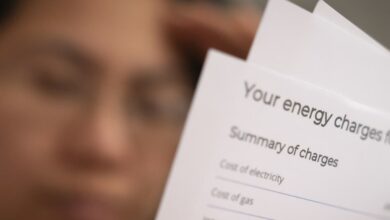UK inflation eases slightly to 10.7% ahead of Christmas

Inflation has fallen slightly ahead of Christmas to 10.7 per cent.
The latest Consumer Price Index figures showed food prices and energy bills continued to drive overall inflation, the Office for National Statistics said as it published the latest data.
The new inflation rate was down from a 41-year high of 11.1 per cent in October.
Jeremy Hunt, the British chancellor, said inflation was “the number one enemy” after the latest figures came out.
ONS chief economist Grant Fitzner said: “Although still at historically high levels, annual inflation eased slightly in November.
Have you been affected by this story? Please contact zoe.tidman@independent.co.uk
“Prices are still rising, but by less than this time last year, with the most notable example of this being motor fuels.
“Tobacco and clothing prices also rose, but again by less than we saw this time last year.
“This was partially offset by prices in restaurants, cafes and pubs, which went up this year compared to falling a year ago.”
The figures come ahead of the Bank of England’s interest rate decision on Thursday, when it is expected to heap further misery on households with another increase..
Economists expect the rate to increase from 3 per cent to 3.5 per cent – higher than any time since 2008.
The expected 0.5 percentage increase would represent a slight cooling in rate increases, after the Bank’s MPC opted for a 33-year record 0.75 percentage point rise last month.
Less than one year ago rates were only 0.1 per cent, having sunk to a historic low in response to the lack of activity during the Covid pandemic.
The rapid rise, coupled with inflation, has led to extraordinary stress on some households as mortgage repayments grow more expensive in response to rate hikes.
Bank governor Andrew Bailey has said the “economic environment is challenging” but stressed that households are better placed to deal with this than during the 2008 financial crisis.
He said: “We have high inflation, demand is slowing and interest rates have been rising. Household and business finances are under greater strain.
“Overall however, both households and businesses are more financially resilient than they were in previous periods of stress.”
Inflation has also been the driving force of strikes across the economy, as workers, many of who have faced years of real-term wage cuts, demand pay rises to keep up with the surging cost of bills and groceries.
The government argues that giving in to demands for higher wages would keep inflation high.





